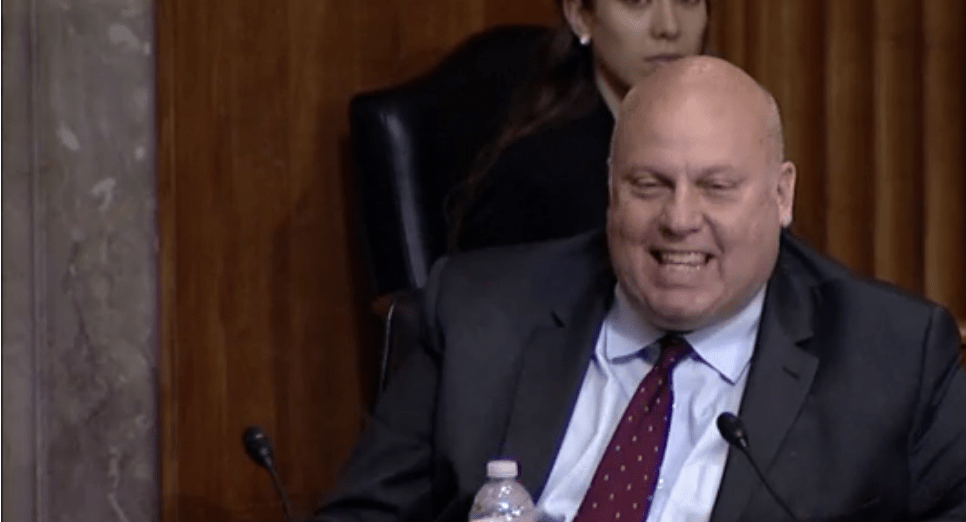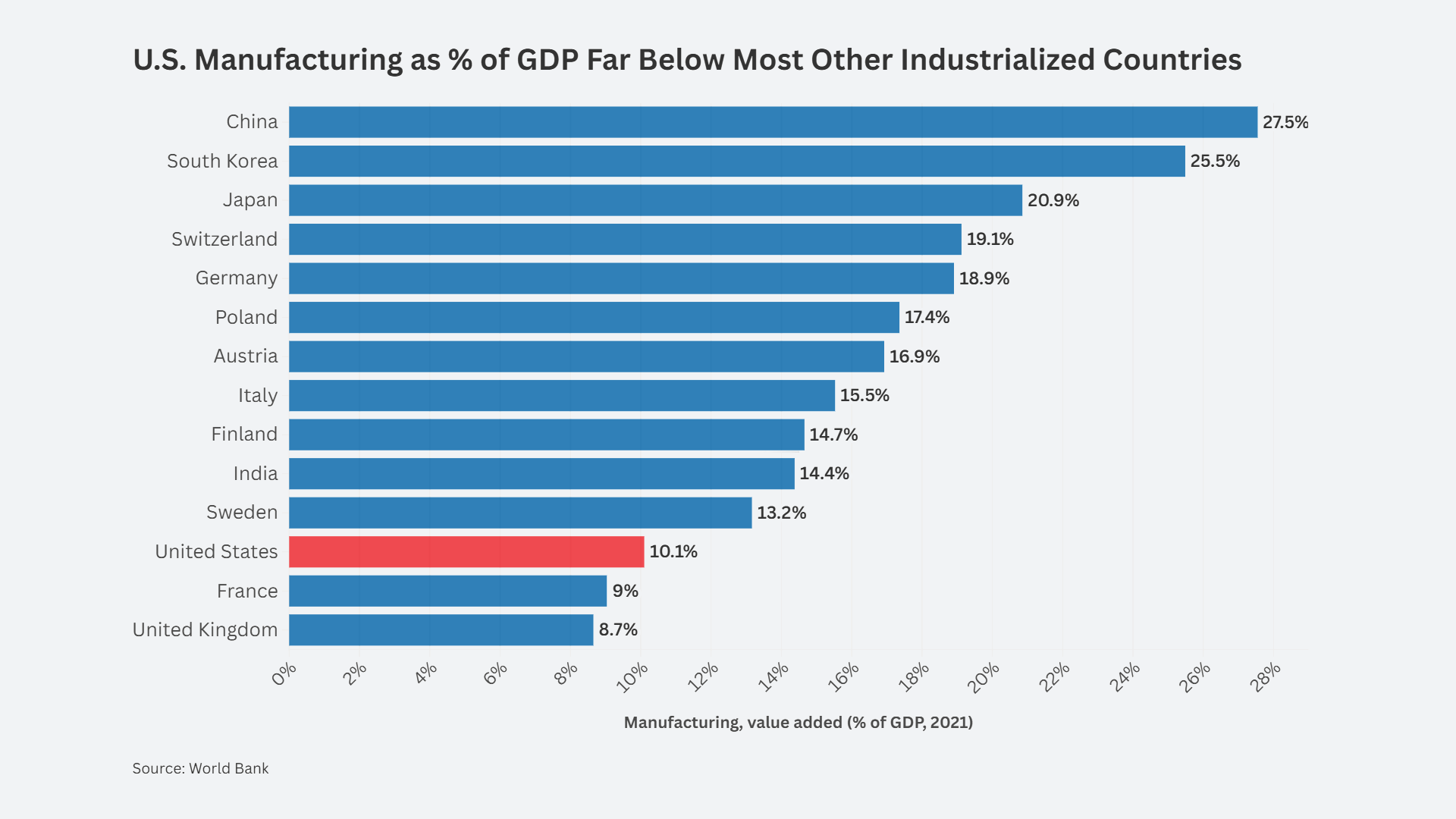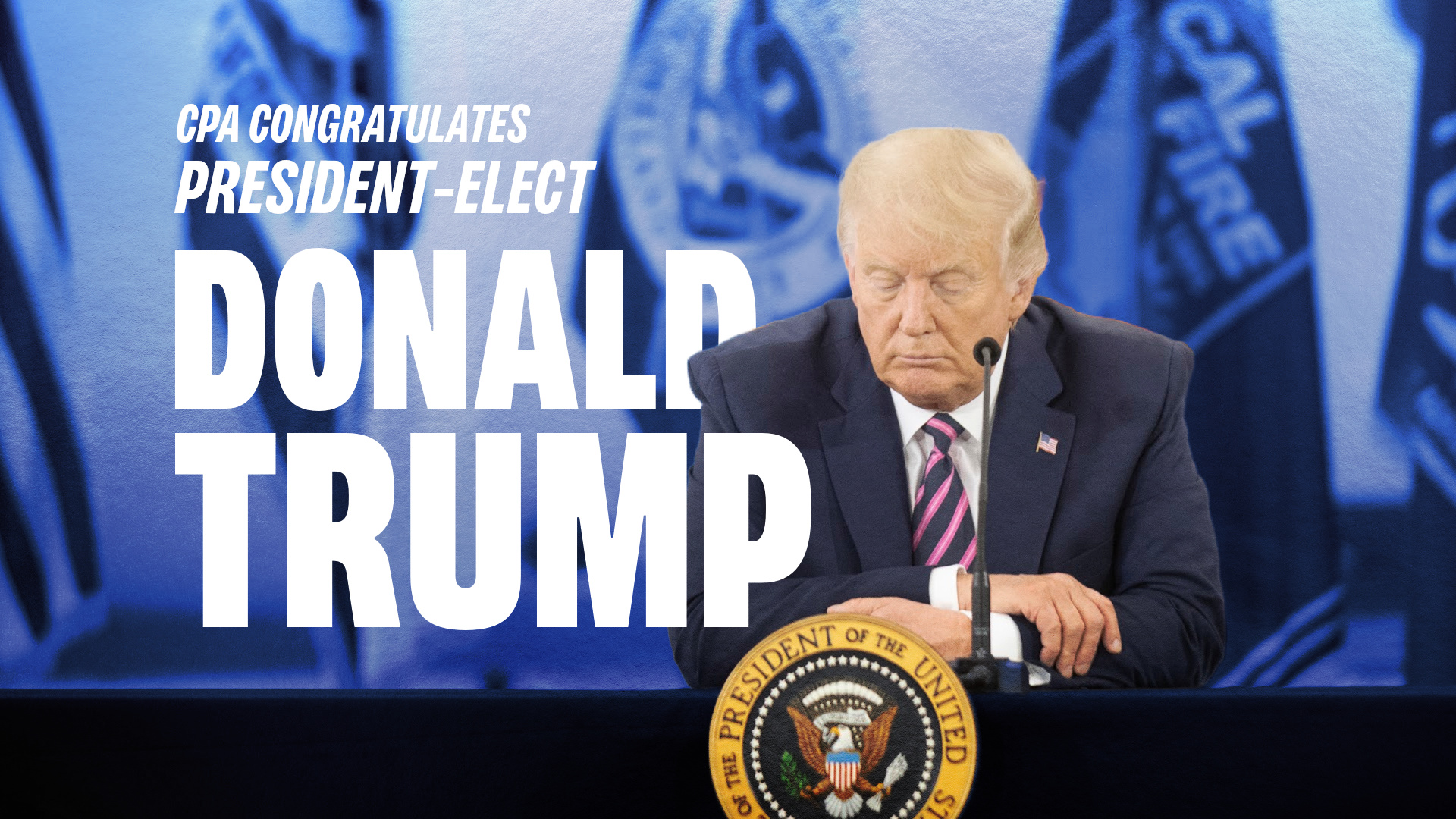The World Trade Organization has been stuck in the mud for years, tires spinning out of control in the pouring rain. Mostly everyone in Washington blames China for the rut it’s in. Others blame a slow-moving, and sometimes political Appellate Body, the global judge, and jury on trade complaints between its members. But the U.S. is the biggest market and we slashed our tariffs to other WTO countries all the way down to a 3.4% average, the lowest of every member. There is very little reciprocity, especially between the U.S. and developing powers like China.
This week, the U.S. China Economic and Security Review Commission held a panel discussion on China and the WTO. And while Commissioner Derek Scissors stole the show on Thursday, the two panelists both argued for the need for reciprocity among trading partners (on tariffs), and tossed around the idea of challenging China with a non-violation complaint in the WTO.
Scissors, a resident scholar specializing in Asia at the American Enterprise Institute in Washington DC said that if you asked China to reform its economy to be more in line with the powerful members of the WTO, “they would laugh at us because we do nothing to respond to their behavior.”
China is still poorer than the United States. But the extent of the differences of economic models, the enmeshed economic relationship between China and the U.S., and the overall size of the Chinese economy, makes it different than other developing economies like Brazil, for instance.
“Our income inequality problems in the large WTO member states are due to China, so I don’t need to renegotiate my market access commitments to the WTO, I only need to renegotiate that with the Chinese,” Scissors said, adding that one alternative is to keep our market access tariff rates to others, but treat China different as a matter of reciprocity as they have greater access to the U.S. market than the U.S. has to its market.
Here, Scissors is saying we can keep our 3.4% for the rest of the world, but should take it away for China.
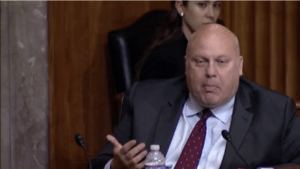
AEI scholar and Commission member Derek Scissors stole the show on April 14 in a panel discussion about the WTO.
Managed trade was brought up consistently during the panel discussion. A lot of that comes in the form of trade remedies (like safeguard tariffs paired with quotas to control the volume of imports). But denying our 3.4% WTO commitment to China and no one else is precisely what the WTO’s “Most Favored Nation” clause says we’re not supposed to do. Every WTO member is entitled to our 3.4% average tariff. The U.S. does offer better than 3.4% duties to specific nations through bilateral free trade agreements.
“You can argue that either China brings market principles into its economy, or you need to decouple. But that’s kind of black and white thinking,” said Robert Staiger, Professor of Economics at Dartmouth College. He was one of two panelists. His written testimony on how to handle China with existing tariff rules can be found here.
There are policymakers who say that the WTO is not set out to handle a non-market economy, but Staiger said that is not always the case. He cited Czechoslovakia. When it joined it was a state-run economy with a managed set of imports and exports.
“Suppose China committed to increase imports in order to achieve a balance and they could do that any way they wanted,” Staiger proposed to the Commissioners as one way China can be dealt with inside the WTO without leaving the WTO.
However, and no one brought this up, oddly, the Phase One trade agreement came with import commitments that were not met. China didn’t come close to buying from us what they said they would.
Staiger said the U.S. needed to use countervailing duties to its advantage.
“If they don’t like what subsidized trade is doing to workers and income distribution then you need to have some way to block (that trade). If you can block it with a countervailing duty, then that is the right way to handle it,” he said. “The problem with China is the U.S. has found it very difficult to use CVD because the subsidy is not transparent. That distinguishes China from other countries.”
Terence P. Stewart, a former Managing Partner for Stewart & Stewart LLP, the only other panelist, said that China makes CVD cases difficult. “The U.S. continues to bring countervailing and anti-dumping cases against China, but China instructs its companies not to respond to a lot of these cases request for information,” he said.
Commissioner Carte Goodwin wondered what a case against China for nullification or impairment of WTO responsibilities would look like. This is an option in the GATT/WTO playbook for when a country is finding other ways to deny imports that may not precisely fit with a specific WTO rule.
Panelists said a case could be brought against China in this regard so long as it was also accompanied by case specifics, meaning companies and product lines had issues with China’s trade practices.
“The case that you have to argue in the WTO against China is that you had legitimate expectations back when China was allowed into the WTO and that there would be market access improvements in China that were not realized over time, like we offered them through permanent most favored nation status,” said Staiger. “We can acknowledge that things have not worked out since 2001…and we need to rebalance our trade commitment. Why would China agree to that? Because I think they are aware that this dispute and friction between them and many countries could really make the WTO collapse. I think it’s that serious.”
Staiger said a renegotiation of the China relationship inside the WTO would be one part legal, one part diplomatic and one part commercial. He said that is what the original General Agreement on Tariffs and Trade — the GATT — was designed to do some 75 years ago this year. “China has huge skin in the WTO game,” Staiger said.
But Scissors doubted China would be reciprocal at all, even under the auspices of the WTO. Nearly every commissioner passed on the Q&A session to give Scissors more time to question the panelists.
Scissors called China “active predators” in the U.S. economy.
“They are much better at intimidating our firms and stopping them from bringing up cases against their companies,” Scissors said. “They are better now at intimidating other countries. I see the main activity of China’s economic engagement as being relocating more economic activity to China to allow exports to bring in the foreign exchange (dollars, euros) to offset capital flight caused by domestic repression (austerity). And if you can relocate economic activity through predatory behavior, so be it. If they were not in the WTO, what would happen to China? What is the cost to them if they leave?”
Staiger, a professor with wordy responses, was interrupted a couple of times to be concise on what a WTO sans-China would mean to China.
“They lose the rules-based trading system,” Staiger responded. “They are a major trader. If they lost that system, you can argue that they are exploiting it now, but without the system, they would get far fewer gains.”
From Staiger’s testimony on the GATT and MFN: 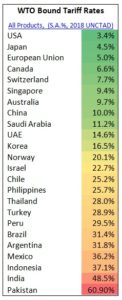
Historically GATT has extended to its developing country members an exception to the reciprocity norm, codified under “special and differential treatment” (SDT) clauses. These SDT clauses were intended to provide developing countries with a “free pass” on the MFN tariff cuts that the developed countries negotiated with one another, and in this way allow developing country exporters to then share with exporters from developed countries in the benefits of greater MFN access to developed country markets. In the presence of SDT the fact that third-party spillovers from bilateral tariff bargaining are neutralized when those bargains abide by MFN and reciprocity now carries with it a more negative connotation….America saw the WTO Doha Round as its final opportunity to get fast-growing emerging economies like China and India to slash their duties on imports of goods, which have been reduced in previous rounds but remain much higher than those in the rich world. See chart above. It wants something approaching parity, at least in some sectors, because it reckons its own low tariffs leave it with few concessions to offer in future talks. But emerging markets insist that the Doha Round was never intended to result in such harmonization. These positions are fundamentally at odds….The essential idea is to find a way to implement the set of tariff commitments that the current WTO membership would choose to negotiate if countries were not constrained in their negotiations by their pre-existing tariff bindings. This means providing countries with the flexibility to first raise their existing GATT/WTO tariff bindings in an orderly way when necessary, so that they can then engage in reciprocal MFN tariff bargaining with all willing WTO-member bargaining partners.



